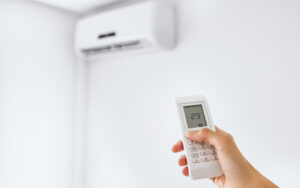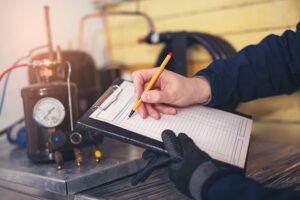Troubleshooting Common Water Heater Issues
A properly working water heater is crucial for daily tasks like showering, washing dishes and doing laundry. When issues arise, they can be frustrating and, if left unaddressed, may even cause property damage. Some problems might seem minor initially but can quickly turn into costly repairs. If you’re dealing with any of the common water heater troubles below, it’s best to take action sooner rather than later to avoid bigger headaches and ensure your hot water continues running.
No Hot Water
If your water heater isn’t producing any hot water, the problem could be with its power source or heating components.
- Electric water heaters: A tripped circuit breaker or a faulty high-temperature cutoff switch can stop the unit from heating.
- Gas water heaters: The issue could be a malfunctioning gas valve or an extinguished pilot light.
For both models, a electric and gas water heat a burned-out heating element may also be to blame. In all cases, a professional can inspect your system, reset electrical components and replace any faulty parts to restore your hot water.
Brown or Rust-Colored Water
If your hot water looks brown or rusty, it’s often a sign of corrosion inside the tank. Over time, sediment and rust can accumulate, which can lead to discolored water.
- A failing anode rod, the part designed to prevent rust, can allow corrosion to develop.
- Sediment buildup can also be a contributor to murky water.
Sometimes, flushing the tank can resolve the issue, but if the corrosion is severe, replacing the unit may be necessary.
Lukewarm or Inconsistent Water Temperature
Fluctuating water temperature can make everyday tasks frustrating. This issue could stem from:
- A cracked dip tube
- A faulty thermostat
- Sediment buildup
A technician can diagnose the problem, replace faulty parts and ensure your water heater is set to maintain steady temperatures.
Rumbling and Popping Noises
If you’re hearing loud rumbling or popping sounds from your water heater, that’s often caused by sediment buildup at the bottom of the tank.
- Over time, minerals settle and harden, forcing the heating element to work harder.
- When water gets trapped under the sediment, it overheats and creates popping noises.
A professional can often flush to clear out the buildup, improving performance and extending the unit’s lifespan. In extreme cases however, replacing the water heater might be the best option.
Rotten Egg or Sulfur Smell
A strong sulfur or rotten egg smell in your hot water is usually caused by bacterial growth inside the tank.
- This is common in water heaters that sit unused for long periods or in homes with well water.
- The bacteria interact with the anode rod, producing hydrogen sulfide gas, which creates the odor.
Solutions include replacing the anode rod, flushing the tank with a cleaning solution or treating the water supply. If the smell lingers, a technician may recommend installing a powered anode rod to prevent future bacteria growth.
Water Heater Leaks
Even a small leak should never be ignored, it can quickly escalate into major water damage.
- Common culprits include a corroded tank, a loose pressure relief valve or cracked plumbing connections.
- If you see water pooling around your unit, shut off the power or gas supply and call a professional immediately.
In some cases, simple fixes like tightening connections or replacing a faulty valve can solve the problem, but if the tank itself is leaking, you’ll likely need a full replacement.
Screeching, Whining or Grinding Noises
Strange noises from your water heater could signal restricted water flow, high pressure buildup or a failing heating element.
- Screeching sounds may indicate a partially closed valve blocking water flow.
- Grinding noises can result from mineral deposits on the heating element.
A professional inspection can pinpoint the issue, clear out any buildup and ensure the system is functioning smoothly.
Scalding Hot Water
If your water is dangerously hot, it’s an extreme safety hazard.
- The thermostat may be set too high or malfunctioning.
- A faulty pressure relief valve can cause excessive heat buildup.
- A broken high-temperature cutoff switch may allow water to overheat.
A technician can adjust your settings or replace malfunctioning components to ensure a safe and comfortable water temperature.
We’re Here
Don’t’ let water heater issues, disrupt your routine or day. Whether you need a repair or a replacement, a professional can help restore hot water and keep your home running smoothly. If you’re experiencing any of these common issues, don’t wait, schedule a service appointment today and get your water heater back in top shape.
You May Also Like

Ductless Multi-Splits Are an Efficient Whole-Home Comfort Solution
For homeowners in Decatur, GA, comfort and energy savings go hand in hand. While traditional central HVAC systems have long been the… Continue Reading Ductless Multi-Splits Are an Efficient Whole-Home Comfort Solution…

Implications of Using a Furnace with Dirty Burners
Your furnace is the heart of your McDonough, GA home’s heating system, especially when temperatures drop. However, if you’re not keeping up… Continue Reading Implications of Using a Furnace with Dirty Burners…

Save Big on Qualifying Heat Pumps with Federal Tax Credits
Give yourself the gift of lower heating and cooling bills for 2025. Federal heat pump tax credits can save you as much… Continue Reading Save Big on Qualifying Heat Pumps with Federal Tax Credits…
